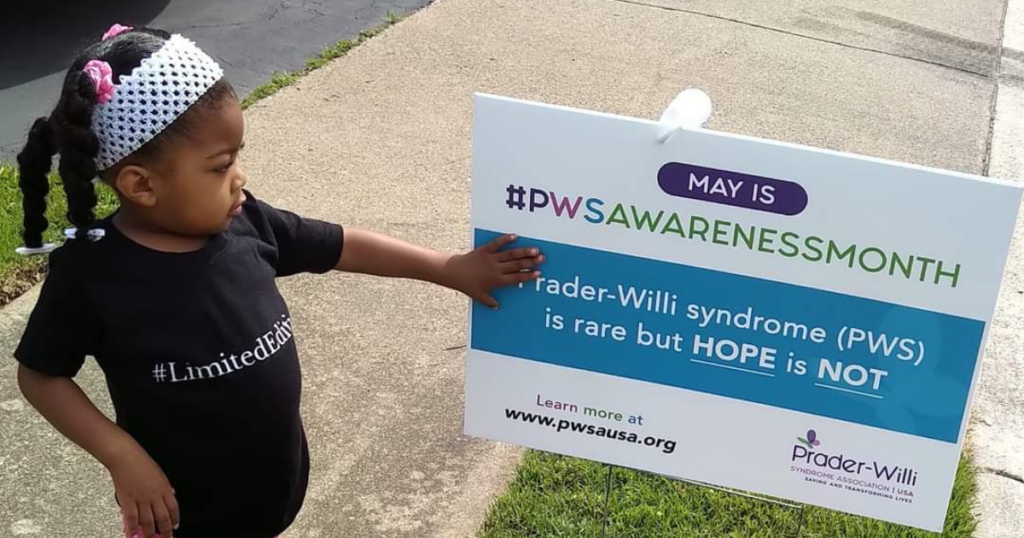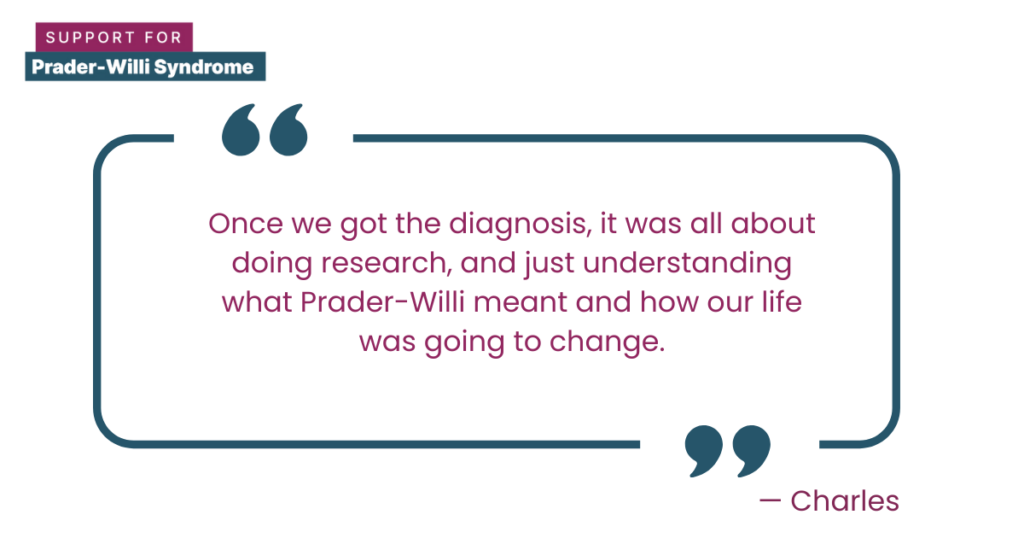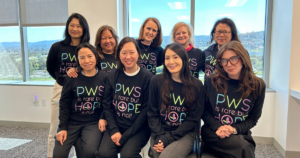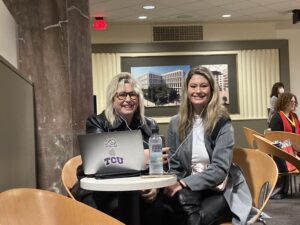
For Charles and Gennelle, the arrival of their daughter, Angelica, brought immense love and excitement, as well as a journey unlike any they had expected. Diagnosed with Prader-Willi syndrome (PWS) before birth, Angelica’s life has been shaped by unique challenges, from low muscle tone to delayed milestones.
Through every step, Charles and Gennelle have shown an unwavering commitment to advocating for Angelica’s needs, equipping themselves with knowledge and resources, and seeking out a supportive network to ensure Angelica can reach her full potential.
This is a family story of advocacy, resilience, and the boundless potential that comes when families and communities unite to support a child living with PWS. For the family, advocating for Angelica isn’t just about managing her daily needs; it’s about setting her up for a lifetime of possibilities.
Facing an Early PWS Diagnosis with Fear and Determination
Angelica’s Prader-Willi syndrome diagnosis came early in pregnancy at just 20 weeks, following a genetic screening. The news was daunting for Charles and Gennelle. As parents, they felt a mix of grief, fear, and an overwhelming need to understand what the future held. Gennelle had experienced the heartache of loss and approached this pregnancy with great caution and care. When faced with Angelica’s diagnosis, she instinctively knew she needed to arm herself with as much information as possible to prepare for the journey ahead.
Gennelle and Charles sought the guidance of a genetic counselor and dove head first into research to understand what Prader-Willi syndrome would mean for Angelica and their family. They understood that knowledge was power, and being well-informed would allow them to be a stronger advocate and protector for Angelica. This early experience set the foundation for their approach to raising Angelica: to never shy away from a challenge but to meet it head-on with hope and relentless determination.

Early Interventions and Overcoming Initial Challenges
When Angelica was born, Charles and Gennelle were immediately confronted with the first physical challenges posed by Prader-Willi syndrome. Babies with PWS often have low muscle tone. Angelica had weak reflexes and a floppy body, which impacted her ability to move and interact in the way other infants might. Even simple tasks like lifting her head or grasping a toy were initially difficult for her. These early challenges made clear that Angelica would need significant support to help her develop the strength and coordination many children naturally gain.
Angelica began early interventions as a baby, including occupational therapy, to develop her muscle and motor skills. As she grew older, she began early intervention at home, however, she was able to transition to an early childhood special education program. Being in different environments and around other children has been invaluable for her development. Watching her peers has allowed her to see other children model language, play, and physical skills. This exposure has motivated her to push herself, even when the effort felt challenging.
Navigating Behavioral and Food-Related Challenges Associated with Prader-Willi Syndrome
As Angelica moved into toddlerhood, new challenges emerged. Prader-Willi syndrome presents itself in various physical, behavioral, and cognitive symptoms; one of the hallmark symptoms can be hyperphagia, which may manifest as a constant preoccupation with food. For Angelica, it became increasingly difficult to move through her day without thinking about her next meal or snack. This made it challenging for not only Angelica but also her entire family, as they work to ensure her environment supports her health and well-being.
The family took proactive steps to address this symptom, educating family, friends, and caregivers about the reality of hyperphagia in PWS. In social settings, they’ve set clear boundaries around food, ensuring Angelica has meals and snacks that meet her needs without overwhelming her. When attending gatherings, they inform others in advance about their way of living with PWS to ensure Angelica is comfortable and safe.
Through open communication and education, Charles and Gennelle have fostered a supportive community around Angelica. Managing Prader-Willi syndrome symptoms is about creating a positive environment where Angelica feels included, respected, and understood. With this approach, Charles and Gennelle have set a foundation of advocacy and awareness that ensures Angelica can navigate her world with confidence, knowing her family and friends are by her side, ready to support her in overcoming each challenge.
Pushing Boundaries: Building Confidence and Independence for Angelica
Charles and Gennelle believe that Angelica deserves every chance to experience life’s joys, just like any other child. They approach social outings with careful planning and a focus on maintaining her health and safety, but they also make space for her to explore, have fun, and feel like any other child her age. Their philosophy is one of balance: encouraging Angelica to engage with the world around her while also setting boundaries that support her well-being.
Charles and Gennelle have set high standards to assist Angelica in gradually building her independence. They work closely with her to teach skills she will need to navigate daily life safely, like making healthy choices, understanding her limits, and managing her emotions.
These lessons are taught gently but consistently to empower Angelica to take on more responsibility as she grows. By pushing boundaries in a safe way, Charles and Gennelle are setting Angelica up for an independent future where she feels both capable and confident.
Creating Lasting Impact: The PWS BIPOC Affinity Group and Community Building
Beyond advocating for Angelica, Charles and Gennelle have held a meaningful role in the broader Prader-Willi syndrome community. Recognizing that people of color are often underrepresented in PWS advocacy and support groups, they co-organized the PWS BIPOC affinity group.
This advocacy group, in collaboration with the Prader-Willi Syndrome Association (PWSA), provides a supportive space for Black, Indigenous, and People of Color (BIPOC) living with or affected by PWS, helping families connect, share resources, and find strength in shared experiences.
Through their advocacy, Charles and Gennelle are not only creating a better world for Angelica, but also building a more inclusive PWS community that reflects the diversity of all those impacted by the syndrome. Their work in the PWS BIPOC Affinity Group is helping to create an environment where every family can feel seen, heard, and supported, regardless of their background.
Looking Forward: Hope, Resilience, and the Power of Advocacy
Charles and Gennelle’s journey is a testament to the power of love, resilience, and unwavering hope. They are deeply committed to advocating for Angelica, helping her build the skills and confidence she’ll need to navigate life on her own terms. Their story shows that, while PWS presents real challenges, it also brings growth opportunities, both for Angelica and for the entire family. By pushing forward with hope and determination, they inspire others in the rare disease and PWS community to do the same.
Their belief in a future for Angelica beyond the limitations of PWS fuels their ongoing advocacy. They know that every small victory, every learned skill, and every connection made within the community brings them closer to that vision. They encourage anyone on a similar journey to remember, they are not alone. Support for Prader-Willi Syndrome offers inspiring stories and a wealth of resources for individuals living with or caring for those with Prader-Willi syndrome.
Frequently Asked Questions
What is Prader-Willi syndrome?
Prader-Willi syndrome (PWS) is a rare genetic disorder caused by an abnormality on the 15th chromosome. It is characterized by insatiable hunger, growth hormone deficiency, and behavioral challenges.
How is Prader-Willi syndrome diagnosed?
A pediatrician will typically suspect PWS based on clinical symptoms such as hypotonia (muscle weakness or “floppiness”), low muscle tone, and poor sucking ability in newborns. Diagnosis is then confirmed with genetic testing.
Where can I learn more and become involved in Prader-Willi syndrome advocacy?
To learn more about Prader-Willi syndrome, sign up for updates and explore opportunities to get involved with the PWS community.
C-US-PWS-00063 V1 11/24


